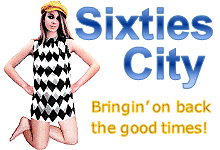

 |

|
|
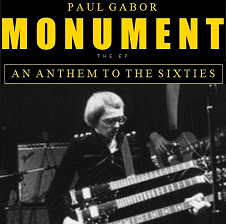 |
Paul
Gabor (aka Kaponya) is a Hungarian rock musician and producer now living
in New York. Besides his prominent role in founding early Hungarian rock
he is also a veteran of the legendary New York City clubs Max's Kansas City
and CBGBs. His music is based on 'The British Invasion' and has metamorphosed
many times, only to return to its roots today as expressed in his latest
grand production "Monument:
Requiem and Celebration of The Sixties". Paul Gabor's 'Monument' project is rock music, evoking the moods and sounds of the Sixties, enhanced by the use of symphonic orchestration and several unique forms of expression. It has a vision; an overall concept, a message, a theme: the passing of a generation and era that has had a profound impact on the whole world, The Sixties. The music is visual by nature; ready for a following video-version, and has a well-planned full album continuation. The EP is essentially ready as a "glorified demo" as it was designed to be. The project's goal is to elevate an already great music product to fully professional levels and make it available for large audiences using the best talent, production techniques and technology, combined with lots of work and financial support. He is also working on The Paul Gabor Catalog, a collection of his unreleased 27 albums, covering a spectrum of unique musical styles and eras. One of these is "The Funny Fools: Resurrection" - a recreation (or restoration) of his legendary first band's music. The reflections below are excerpts from a book intended to accompany the music album (from which some of these unique memories are borrowed, with thanks). Listen and Watch on You Tube: Andy's Girl - The Funny Fools, Resurrection Paul Gabor Kaponya The Rise and Fall of the famous Funny Fools - A pop group in Sixties Hungary |
|
|
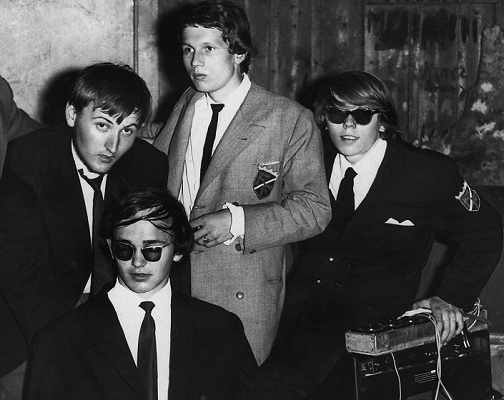 |
"Bitlisz"
- said Peter Buchberger. Or he might have said it so: "bitls",
which was more or less correct. After all, we were both freshmen highschool
students in a class that had English as a major (for Peter, the second time).
So, he was a relative senior, sharing a desk with me. He knew what was going
on, and what really was going on, according to Peter, was the Bitls. They
were the new thing, the big thing, the real thing. England was on her knees
and young people went crazy. Real crazy, like losing it …are you getting
this, Gaby? The conversation we had been having took place on King Street,
the Penny Lane of our corner of the world, walking home like we did every
day, straight from the high school we attended at the east end of Kiraly
Utca. The point was to decide who likes what band the most, for we were at the age when these things suddenly acquire disproportionate importance. I was being most impressed with the Spotnicks. They were awesome! I'd already been playing Amapola - or at least making a good attempt at it, but Orange Blossom?…Orange Blossom! That sound! That technique! How could they even play that?.. and now Peter says it's the Bitls. I'd better pay attention. Here I was, at 16, the budding young guitar player and I hadn't even heard of the Bitls let alone their music. So how is it? The music I mean... Peter didn't sound too convincing: it's better than anything. How is it so good? Peter couldn't answer that. But I knew at that point that it was something profound and glorious, something that would sweep me off-and-away for the rest of my life. It was a premonition. Supernatural. The next days I spent turning the waves upside down and inside out on every radio set I could get my hands on in search for Beatles music. And those radio waves were a mess - I couldn't understand the announcers. Despite the year I'd completed with my English grades all A-s I still couldn't make out what Radio Luxembourg DJs were blabbering. Nobody could. I must've stumbled across Beatles music in the vast radio space mostly made up of static and interference but I didn't know if I did, I had no reference, and boy, were those waves a mess! In this frustration one dubious hope remained. An almost-miracle. And it happened. To everyone's greatest surprise State Radio Petofi (largely corresponding to BBC 2) made a slight political mistake and announced the formal introduction of The Beatles' first LP. We were glued to the radio, every self respecting young boy and girl in the nation. The broadcast was clear. Un-jammed. And the music was…great. Different…So different that we all lacked the foundations - both musical and cultural - to be fully able to appreciate it. An almost-disillusionment. It left us wide-eyed but unsatiated. Uneasy, restless. Projection sublime: a big warm wave, seductive and shiny was coming towards us over the Iron Curtain to deliver us to worlds colourful and happy and free. In the music I didn't yet fully understand there were qualities, tender messages that were to trigger two basic emotions: one for the need to cry and one to scream. The Department of Agitation and Propaganda was in a fix. A dilemma. For even then, just barely out of the '56 revolution there must've been thinking heads in there too; heads who were capable of assessing a lose-lose situation. The Official Propaganda of The Propaganda Department was that the West was employing a Viscous Propaganda of their own for sometime, the so called "Strategy Of Destabilising" - as in destabilising the very moral fibre of the Social-Communist society by means of bombarding the Eastern European countries with messages which destabilize by making young audiences tune in to their decadent and freedom-suggesting vices: movies and music. Movies like "Gone With The Wind", "Dr. Zhivago" and, of course, "James Bond". These movies were regarded, justly, as the most damaging to communist morale. In the Music Department, until the appearance of The Beatles, there was only one Major Evil - American Rock and Roll. Elvis Presley. He was quickly termed indecent and decadent but the Department had lost that battle in no time; Rock and Roll came and won. By 1960 every decent and morally correct dance school taught true boogie-woogie and rock and roll. The fact that there was no defence against the impact of popular music - as opposed to the movies which, if not shown (and they weren't), were toothless - had caused major concern. |
|
Music was a different beast for them; you couldn't stop radio waves and
your choices of fighting this evil were limited and the end result was dubious.
But so far they managed to stay afloat.The Beatles had changed all that
and the Thinking Heads saw the ultimate futility of anything they could
put up against such a formidable force of Destabilisation. The best they
could do was to delay the inevitable as long as possible - and they did
exactly that. All information was withheld; the little that got through was mislabeled. The music was publicly ridiculed and downgraded in every possible way and those who appreciated this evil capitalist manifestation were oppressed and harassed. But, in the end nothing helped. The point of the matter, however extreme it may sound, is that the music that came out of England in the early Sixties with The Beatles at its pinnacle had unleashed destabilising forces so great that it brought down (directly or indirectly) the whole regime and the whole East European Union with it.So, as those thinking heads in The Department foresaw all this, their actions were limited and delaying in nature. They couldn't fight The Great Wave with the hope of winning. The first thing they did was jamming to death any possible radio station broadcasting to Eastern Europe. After the Beatles-narcotic had slipped into my system in that small dose, soon I was getting withdrawal symptoms. I didn't know that it was withdrawal symptoms for I didn't know what withdrawal was; I only knew that if I didn't get some more of that "not-so-great" music into my system I would surely die. Again, this time even more frantically, I started to search the radio. (The State Radio had stopped broadcasting any new English music - although this was due to copyright restrictions as well as to political motivations). And this is one point among many where the Department's policies backfired. I had no other means of getting my quota of Beatles but to turn my attention really seriously to the West. In the process I soon discovered my saviours; the horrendously jammed short and mid frequencies of Radio Free Europe and Voice Of America; the unjammed but weak and static-noisy Radio Luxembourg and sometimes BBC. Myself, I settled down at Radio Luxembourg which, for the next five years supplied my nutrition with supplements from Free Europe. With this, if I hadn't yet been destabilised, I'd surely gotten so, seriously. I can say that by 1964 the most destabilised segment of Hungary's (as well as the other self respecting East European nations') population were the "beat" musicians. This had brought on the wrath of the State Oppression System in various forms - which in turn made the whole experience even more exciting, even sweet. In some respects much more so than the same experience of our infinitely luckier counterparts who'd had the privilege of having been born in free western societies. At the time of the conversation on King Street I'd already had one little success in my bag of trophies, and a slowly-but-surely progressing career as a would-be rock starlet. In the spring, at the May One festivities, on the stage of one the two big girls' schools my first band, The Blackcollars, had a rousing-screaming success performing some mighty interesting stuff. The concert went like this. Two boys were majoring in the Leöwey Gimnazium's German Branch. (Gimnazium equals high school - not a sporting hall). Charlie Braun (seriously!) sang, quite well, and Rudi Schmidt (yes, they were of German ethnicities) played the drums. They asked my tutor, Joe (who was an ethnic Croat) to team up with me and Zoli on the piano to form a band for the May One gig. We did - under the condition that I would have an original in the program - no problem! |
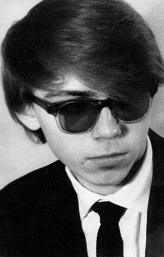 Western Agent! |
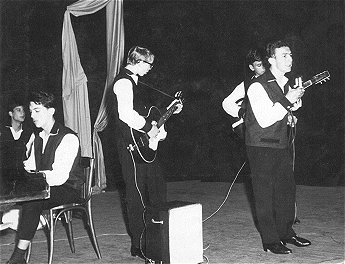 The Blackcollars - my first gig, May 1st 1963 Rudi Schmidt, Zoli, Moi, Charlie Brown, Gulyas. This town is the 'melting pot' of the nation, lots of ethnic Germans, also Serbs and Croats - masters of stringed instruments (like Gulyas, my classmate and first mentor). Note the speaker! Song: "I'm All Shook Up" |
I
sang the lead along with the two harmonies into one mic and we had one amp
called "Wirestack 10 watts" into which we plugged the two guitars. Zoli
played the piano and sang into the air. Rudi's drumset was a low tom, a
footpedal banging it from the bottom, the top was played as a snare, and
there was a regular cymbal attached to it by an extension. We had no bass
- the bass guitar had yet to be invented in Hungary! The conclusion to this 'Hit Song' was such a rousing screaming applause that it took all of us by surprise. We didn't know what to do. But I took it as a clear direction as to which way to go, which is a great improvement compared to no direction, which was what I had before when I was still too young. By the autumn the band had grown stronger and we were playing gigs frequently. Little gigs, like the innocent school-class "Five O' Clock Teas", but also difficult and physically challenging ones - Saturday night weddings in the nearby villages. All-nighters, gruelling gigs. But they paid some money and we could buy amplifiers. Other 'Wirestacks' - 20 watts. The guitar I got for my fifteenth birthday in October, 1962 (It was also my Christmas gift) was a save-the-salvageable solution from my parents, the only practical one. The bug started in me while in eighth grade. Music had begun bothering me, it caused me torture! Nobody in the family had any formal musical background - though my mum sang quite beautifully, as I've found out later. I still don't know where my urge came from but an urge it was, and strong. I did sing in the school choir, never solo, but I sang. Despite that, I was an outspoken enemy of music-teaching. I started crusades to eliminate music from our classes; sabotaged anything that would've educated me, like theory, reading and Kodaly. How stupid - all I should've done was to open my ears and pay attention. It would've helped a lot a little later. But no, I had to revolt - and I revolted against anything that gave me an opportunity. It happened to be the music classes and, later, physics (that's more understandable…) My nature to revolt must've come first, and music was a casualty just because it was there. All in all, eventually I'd dropped my position against music education and some theory somehow stuck to me; it came in handy later on. My relation to music outside the school was entirely different. I remember the first song that got me spellbound was the magnificent "Calcutta Ist Am Ganges" (No Merseybeat yet…). The song, like a bug, infested me and I wanted to play it. Sing it, too, but no lyrics, so I wanted to play. Mum bought me a little toy saxophone that worked on the principle of the kazoo, but had valves and keys like the real thing. I drove everybody up the wall, but played it in key. My favourites were, for a long time, trumpet and saxophone. Then I made drums by covering big glass pickling jars with stout layers of cellophane. You could play them like percussion. Then I got down to the real thing. I fashioned guitar-like things from whatever offered to turn itself into a musical instrument: attached a neck to a thermos bottle and several other similar contraptions. They sounded. Eventually a friend of mine lent me his dad's zither. It was a big German zither, differing from the more primitive Hungarian ones in having a large, resonant belly, which has some twenty open strings over it, some in the bass frequencies. The main part of zithers is a neck with 4 to 8 strings, tuned to an open chord. You play solo or full-chord melody by pushing the strings with something across them, like a little stick, Hawaiian style, never your fingers. But it has frets and you have to press the strings down to meet the frets.(With the German one you hit all those open strings in between melody notes, creating an accompaniment. Naturally it will sound right only in the key it is tuned to). I started to play it like a guitar, pressing the strings down with my fingers, finding solo melodies and simple harmonies. It ate into the flesh of my hands. Deep. This must've been when my parents decided on the guitar… |
|
So, I stayed with the English names, and they had to have some meaning or character. A Beatles photo appeared in the "Tükör (Mirror) Magazine". The retarded text stated the following: "These four young men, holding phonograph records in their hands, are the new musical sensation in Britain. They are "The Beatles". What the picture actually showed - it's a famous, if rare photo, (I still have it, gleaned from the Mirror) - was one of The Beatles' typical tricks: jumping into the air for a photo (guitars in hand, not phono records, stupid!). The quality of the picture was bad yet for any fanatic like me, and other kindred hundreds, it gave clues equal in value to a detective interpreting a burnt picture of a crime scene. We saw the stage (Hamburg?) the hair, the clothes, the boots, the Voxes, the Rickenbackers, Paul's violin-bass and we saw them in the air, having jumped high above the stage. We didn't know how they did it but it was cool, very cool. Aha! they jump! So we learned how to jump while still playing, bouncing up and down. (There is a little bug, a tiny beetle in the fields that bounces. That's how it spends its little life. A Bouncing Beetle. Got it?) Charlie Braun graduated and left The Blackcollars. I took up the lead vocal. A nasty job but someone has to do it… Otherwise the band remained the same but modernised. Updated. Rudi Schmidt played the drums. The girls were dying for Rudi. He was handsome. Tall, dark, intense yet gentle. Somewhat like Charlie Watts. Joe Gulyas played lead guitar, I played rhythm, sometimes lead, and Zoli played the piano, later the bass guitar. Joe and Zoli also sang harmony. This was very unusual in those days, because for most bands Elvis, Cliff and Del Shannon still ruled along with The Shadows. We were different. No Shadows. No Elvis. We did Beatles, Dave Clark, Kinks and whatever we could learn from Radio Luxembourg and Radio Free Europe. We even did twist - it was still a fad and the kids loved it. Whatever it was it had to be vocal oriented. And we did two originals of mine. They were primitive - very - but that was not the point. We practiced at Zoli's home or in mine, unplugged sessions we called "dry rehearsals", much to the joy of our respective mothers. The amped rehearsals which we held at our high schools, brought crowds of school kids and created an immediate following. And we played at the sweet and innocent events hosted by the schools called "Class Tea" or "Class-Buli" (Buli is a diminutive corruption of "ball", also a collective, meaning a "get-together", a "party"; "having fun" etc.). And, on occasion, we played at the Sunday Dances at the dance schools Strange institutions these dance schools were. Bastions of old world charm. Obviously, as remnants of days past, they were, decidedly, what the socialist nomenclature would term as "capitalist decadence". Yet, we were not only allowed, but encouraged to enroll in the dance classes. They must've figured it out that being a communist youth (from now on "youth.com") shouldn't be synonymous with awkward, elephantine and clueless. The young needed to be taught some grace and manners, too - if for nothing else, to be able to behave and also to dance at factory bulis. So, with the exception of morons (and the very poor) we all attended dance schools. Boys and girls. Religiously. Where else could you make body contact? Even kiss!? That was the attraction!! Of course we also learned dancing - we needed it and I'm still proud of it - and manners, but friend, what a dating establishment it turned out to be! That's where our first awkwardly sweet tries of contact with the other sex happened. In the form of innocent first loves. Our hormones doing the cha cha cha. Classes were twice a week. The music was invariably provided by some seasoned, old (like 35), piano player who could play all those dance rhythms easily, at the snap of a finger, sometimes accompanied by a drummer. Every second Sunday evening the school held a Dance. Our version of the "Hop". Ostensibly these dances were to test and improve our newly-learned skills, but in reality they turned into real bulis, events that we craved. With rock and roll being the most popular dance, the bolder teachers started to hire real bands and soon the opportunities came for the teen bands like mine. That was double fun. It didn't matter that we played very little rock and roll. Actually the most popular form of rock-dancing was called "Everybody", a version of boogie-woogie. This was invented at the beaches of The Balaton in the summer of '63. Lake Balaton (a huge, warm, shallow lake with sandy beaches, like a sea; popular with poorer German, Dutch and British families), was the place to be in the summer, to be hip and to get carried away. It was The Scene, the hotbed of new ideas, the place to learn about the newest things from the West, to learn about each other; to make love the way the young like to make love, in a beach-culture environment; almost decadently. It came as close to "free love" as it ever would in the Stupialist era. Our Little California. |
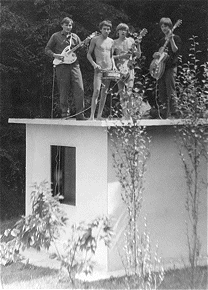 The First Formation - Summer 64 Great bods... Bungalow at nearby resort. Gabor, Nikita, Moi, Wirth. Note guitar in Gabor's hands. Me-made. Called "The Goat Guitar" |
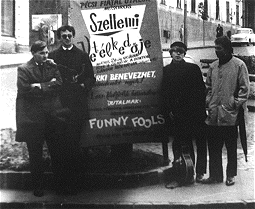 1965 Main Square Gabor, Kelemen, Moi, Georgie. Note CAR in the background. |
Not having played rock and roll mattered only for a short time. The kids
found out that the other stuff was even more fun, even more exciting for
them and they fell for it. For ever. And that's how we - and many other
bands in the country - started to build our foundations. Rocco and The Diamonds.
The Pannonia Curse. The fall of the Old Guard is a sad story and reflects
the political mentality of the time. "Rocco's Diamonds" was the top band
even when I'd just finished prime school. They were legends. They played
American Schmaltz complete with the looks and attitude. Ventures, Duane
Eddy, Elvis, Buddy Holly. Lately, to be modern, they added The Shadows and
played it very well. (Everybody did. Except us.) Their gig was steady, working
for Frantzi Herman, the top dance-school teacher whose place was the best
in the city, the great ballroom called Pannonia Hall in the Grand Hotel
on Kiraly Utca, the main drag. New empires grow on the ashes of the old...
Early spring is armed-services draft time in Hungary. It so happened, that in the spring of '64 three of the guys got drafted. That meant the end of the six-piece band. A farewell gig came and the hall was packed. The band played wearing black mourning-bands on their arms. (This was considered a sin, exciting revolt). The gig went down peacefully but when they announced the End all hell broke loose. The fans proceeded to shove the furniture into a pile in the middle of the dance floor, breaking them. This was gilded period-furniture, the kind you'd expect in a Grand Hotel - even in Hungary. The band was powerless to stop it. I was only fifteen and all the fans were my seniors. I left early. The Police came. Rumour has it that the cops beat and arrested a dozen fans. They also arrested the band. Then, to demonstrate the power of The System they persuaded the authorities to issue the draft summons for the rest of the band. So, everyone in the band entered the service that spring - and service was two hard years in those days. When Rocco came out his spirit was destroyed. He never recovered. At the end of April the dance hall didn't have a band. Papa Herman was a very polished gentleman, a modern-thinking businessman and he told you good rabbi jokes. Enter the Bouncing Beetles. Just making waves, the kind of waves Mr. Herman liked, because it was plain to see that the kids loved the new. So he caught me in front of the Café at the Hotel Nador and asked me to play for him at the Pannonia. Do you think I turned it down? On the first Sunday we had a quarter-of-a-house. On the second, a half. On the third it was packed. On the fourth you couldn't squeeze in Twiggy. The dance "shake" was slowly becoming the fad. The kids went crazy over the new style. (And the bouncing…) It looked totally silly but it worked like a sensation. We were also blasting as much as we could - the hall was big. But we were loud - and that was again something new. Beat music is only good when loud. The louder, the better. Our biggest hit was "Have I The Right" from The Honeycombs. When we played that, the kids were also bouncing up and down with the beat, so that the building swayed. This was the scene, when, from the stage, I noticed the cops. For some perverse joy they called themselves "The Yard" (like in English...) These were plainclothesmen. They stuck out like buffalo in a herd of deer as they were trying to make their way towards the stage. It took them a long time because you couldn't move, cop or not. But they were coming. And they were coming for me. |
|
They say the police stopped the music, declared the gig over and sent everybody
home. And they turned the stage inside-out, looking for me, investigating
the back curtains thoroughly and for a long time, not understanding where
I could've hidden. Then gave up and went home and listened, in secret, to
Radio Free Europe… This was our last gig at the Pannonia. Next week "The
Phantoms" played. I think, in those days they were better. They played the
rougher end of the spectrum, sort of blue-eye R and B, Stones, Animals,
Them, Chuck Berry and played it very well. It was also good to dance to.
(Yet, somehow they didn't generate mass-hysteria). The place became their
steady gig for a year. At least the establishment survived and continued;
it became the main spot to hang out, the watering hole for budding musicians.
Mr. Herman gave me a life-long free pass. I loved to go; as just another kid, to dance, for the girls, for the scene. And to watch the band with a critical eye. The competition which I had to surpass. The following day I was called to the school principal. She was a devout communist. The big, burly gym teacher was also there. After the berating, he took me downstairs, to the nearest barber and my Beatle-hair was cut. The barber took a great pleasure in the act; they held a grudge against us" longhairs". (A while later the gym teacher has apologized). The band was banned from public appearances. So, I formed the Funny Fools that summer - and went on turning the city on its head. Gabor will never forgive me - and he shouldn't. With him in the Army, risking his life to get out, we decided to go - just the three of us - and Mariann. The "Beat Bands Festival" was an annual contest held in the northern mining town of Tarjan. It was a national event and the winner got a foot inside the Budapest music-mafia. We didn't care about that much; our aspiration was just to stir, to stir up well and show… Needless to say, you had to go through a three-stage elimination process and, with the FF riding so high, the final jury still hesitated - until the crowd let its mighty voice be heard. The power of the people couldn't be ignored. I mean, there were some really good bands in the regional finals playing Shadows and Animals quite well, but come on, we did a set of our best own stuff, some raunchy, some sweet, singing three part harmonies and polyphonics and it was good and it was modern, keeping up with the British and, since Mariann was accompanied by us in the solo vocal category, she'd won, too… When we first received the invitation to enter the contest we weren't too keen about it. In true FF spirit we shunned everything that was state-sponsored and manipulated and we knew that this one would be the same and that we would lose in the end. But, we also yearned for more publicity - and got it. Tons! One of the criteria was to perform a Soviet song - not Russian, mind you, which was deemed undesirable - lest anyone attempt some adaptation of Russian folk music (which we happened to like and even had some in our repertoire). This was when we really got ourselves into it. |
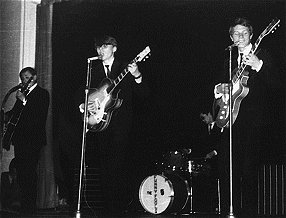 Autumn 1965 The "Doki Club", just off Kiraly Street. Debut concert of our "first, unreleased, LP" of 21 songs in English." |
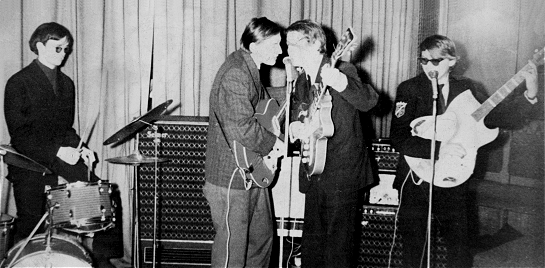 The Olimpia Tavern 1966 Our main digs. Good place, good acoustics. Packed always, even though it was on West End outskirts, in a tough neighbourhood - built for the miners of the nearby uranium mines. Buses took you from midtown, but boy, was it a long walk back. A hundred yards away another band had their steady roosts, The Tremolos. Played top Shadows. We used to go over to hear them but there were always fisticuffs - or worse - there. The Olimpia was more of a Mod hangout. No fights. Sundays, five-to-ten... |
Obviously we would be disqualified - but we would make a point - beat
those bastards at their own game. The underlying fact that gave us the
much-needed moral support to commit such a transgression was a new aspect
in this years' finals. The head of the 'Jury' was to be Zoltan Kodaly.
That settled it - Mr. Kodaly was someone outside of any jurisdiction and
we knew that he spoke our language! Although the rest of the Jury would
purge us, he would be on our side. (He
spent half of his time in Pecs, in what passed for a socialist villa up
on the hillside. He had a colour television, I know, as I was once invited
by his wife who was forty years younger than him).
Being damned western rockers - or rather mods - as we were, we had tremendous
respect for Mr. Kodaly - everybody did - but only a few understood him.
It was around this time that I started seriously experimenting with bringing
Hungarian folk music into rock, very much like Kodaly did to classical.
We'd been, from the very beginning, playing our own adaptations of folk music, but we made it come out in a true Merseybeat sound. The rhythm was a different thing - it was a sensitive trade-off. The Hungarian ones had a natural tendency to lend themselves to solid straight beat, even to rock. We did a Polish and a Russian one, too. They were beautiful but undanceable. This time I really started to go all the way and we all believed in the concept. My biggest feat was in procuring a cimbalom. The cimbalom, the Hungarian version, is a serious instrument - a cross between a dulcimer and a grand piano. The common thing with the dulcimer is that you hit the strings with a pair of little curved sticks. The strings are multiple, like that of a piano, strung across a large, resonant wooden body supported by a steel frame, also like a piano's. It stands on four massive legs and weighs 200 pounds. It's tuned like a piano but arranged differently and, instead of the keys, you use sticks. To play an arpeggio you have to hit very fast. The Hungarian one has complete octaves down to the bass region - hence the steel frame support. The instrument is an essential one in full gipsy bands, playing the role of a piano (you can hear one in the marvellous piece of music, "Earth" by Vangelis c. 1979). I thought of the instrument being outfitted with pickups. Just playing it in a simple fashion would make a tremendous sound impression and it would have a pivotal role in our new music. Eventually I found a beautiful, antique piece and bought it. It cost a lot but it was magnificent. The honour of playing it fell to Gabor - I made him volunteer! He would become the world's number one-ranked rock cimbalom player! However, learning to play it was a different matter so I learned it too, to a point that it started to make musical sense - and it came hard. This was going to be our material, our secret weapon, at the Tarjan Festival. A dark shadow still cast itself upon our plans as Gabor was up for the draft - and so was I. It was just unimaginable for us to serve in an army in which we didn't believe; in an armed force that stood for ideologies we abhorred and we did everything in our means, including endangerment to our health, to get around it (a few of our friends never came out of the service alive…) I got around it - beat the rap - but paid for it dearly. Gabor, no matter how hard he tried (and he tried much harder then me) - couldn't. He was to enter the gates in three weeks. He insisted that he'd beat it yet and he was applying damage to himself. None of us in the band had any doubt that he would succeed in beating it. He didn't. They wanted him. Just two weeks before his marching-in we accepted a contract to play three months, every night, like a lounge band, at the elegant Café Mecsek on Main Square. We needed the money and we wouldn't play lounge music more than two hours out of the five. Our opening night coincided with Gabor's check-in to the military. He went in the morning, telling us he'd be back by opening time and we were sure that he would. But he wasn't. In the resulting emergency George called in his brother, Zoltan, who knew our material and filled in easily. The hotel management was not happy - but they had to accept that the military had priority. The chief exec's name was (and I'm not kidding) Kennedy…and poor Mr. Kennedy came into conflict with the political powers on our account, a second time. |
|
The first week at the
Café went down smoothly, if under-attended - not many were interested
in the crippled band - but it was easy and fun to play there. What threw
the monkey wrench in the works was our upcoming appearance at The Festival.
It would only take three days of absence but, when we dropped the line
to Mr. Kennedy, he started to see red and simply denied our request (and
he was to see red, the real thing, a little while later). He
was right, but we wouldn't take no for an answer. We wanted to go. We
wanted to go badly. We knew that Gabor would get himself out. Mr. Kennedy
wouldn't budge - city prestige at stake or not. Drummer Kelemen got into
action. or rather, he kind of sneaked into it. Or, more accurately, his
dad sneaked into it and what transpired then gave us a glimpse, for the
first time, of drummer Kelemen's strange connections…
At this time we'd only learned of the outcome: Mr. Kennedy came down, gave us his blessing and wished us success! We had a week to get ready. Gabor was still locked in and we knew nothing of what was happening to him but he managed to send word: he'd be out soon. The days passed. We had to make contingency plans. To go or not to go? Then some other bad news came: Zoltan Kodaly had died and with him our hopes and secret strategies. Obviously, in his place there would be a government mule - some schmuck. This is when I should've cancelled our participation but, this far into the game, I couldn't. I simply could not do it. If it wasonly the three of us, so be it. We were going and, in the end, this was the right decision. In the remaining couple of days we reworked the whole thing that had been the Funny Fools of yore. Without Gabor the poking-fun-at-soviets had to be cancelled. Instead, we learned the least notorious piece of "Soviet Beat". The folk element was dropped and the cimbalom was put out to pasture. To compensate for the losses I translated most of our own songs from English to Hungarian. They came out good - not because they sounded better, but because the fans could finally connect. After all, we were in Hungary and they were Hungarians and nobody understood English lyrics (not even the English…) We sounded OK as a trio but the vocals suffered badly. The time had come but no Gabor, so it was the three of us: Georgie, Kelemen and me - and Mariann. She had hung around with Peter Buchberger since the beginning and she was pretty, but her singing left a lot to be desired. We managed to squeeze her in but Peter had to take his own transportation, just like the many fans who followed us everywhere, either hitch-hiking or by train. So far, this was the farthest we'd ever been. For transportation we chose Mr. Gruenwald. He was the most expensive but he was reliable and also an intelligent person, sort of an almost-fan - and he owned a Ford Taurus, the European edition. It was a car and it got us there, always, but we paid an arm and a leg for the privilege of riding in it. It was good for our image and the Commies hated us for it. We packed just two Selmers in, plus the drumkit. Whoever rode in the front seat cradled the snare but it was passably comfortable, and fast. Gruenwald drove in car races and he was good - he never did less than 75 m.p.h. which was risky on Hungarian roads. Our spot was scheduled for Saturday with a sleepover to do the Sunday Gala. We left on Friday to do two gigs which served as testing grounds for our new material. The small towns on the way were our strongholds; they loved us there - the whole town came to Main Square. |
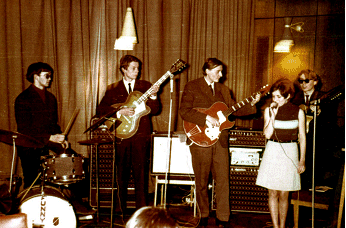 "Kinga" at The Olimpia Sweetheart then – wife now, singing Cilla Black's "A Fool Am I". |
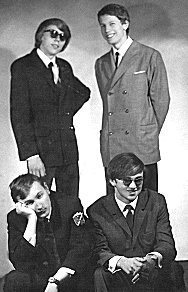 'Funny Fools' promo shot 1967 Kaponya, Georgie, Gabor, Kelemen |
We rolled
into town around five. On the perimeter some outposts stopped us and gave
us directions. As they glanced at our invitation papers one of them said
"You guys are supposed to be on stage at six!"
Our paper said eight and we were late even for that. I asked the nearest sentry. "Who is the Head of the Jury?" "George Komjathy" said the post. Ah, beautiful. My old nemesis. Surely no Kodaly. This guy was a good-for-nothing ass-licker of the establishment with two radio shows a week, someone who pronounced Michelle of The Beatles as Mikéle - like in Greek. At the next square stood two obligatory policemen. They stopped us - didn't like the car - and checked around inside. "That guy" said one cop to the other behind him. "I think we should take him to the barber". Gruenwald interjected. He was good at this - he had experience. "Excuse me but these gentlemen with me are appearing at tonight's show on the Festival and we are late". Without waiting for an answer he drove off. As we arrived at the front of the theatre the crowd immediately noticed us - I don't know how, because we'd never played around there; I guess the fans must've gotten there before us - and created quite a scene (indeed I'd spotted some familiar faces in the crowd). It was a welcoming scene, more friendly than not. I was so upset about the cop's remark that I burst out of the car, marched straight in and demanded to see Mr. Komjathy immediately. I couldn't get to him but his assistants appeared helpful. "What is the problem?" "Listen. I'm the leader of The Funny Fools from Pecs. We just got here after a two hundred-mile drive which cost us a fortune. Now, this cop is threatening me with intrusion against my personal freedom. I want Comrade Komjathy (this is how I had to address him here as I was talking to some young, ranking Communists from the Culture Department of the Young Communists' Organization (youth.com) which sponsored the event) to guarantee my personal safety or we'll turn right back!" The young cadres were polished and polite. One of them said "Comrade Komjathy is listening to performances. I will give him your message if you insist, but I can guarantee it myself that you will have no such problem here in Tarjan. But... aren't you late?" The young cadre was smooth; he defused me. I felt reassured and went back to the car. The guys had already unpacked the equipment and we had half an hour to get ourselves ready. "So, how did it go with Komjathy?" asked George. "I'm alright for now. The cops won't bother me. What a stinking country." "You are stupid enough" remarked Gruenwald "Why is it good for you to create a scandal as an entrance?" He didn't like my hair either. He was a Frank Sinatra fan. I helped to drag the stuff to our performing room. A band played somewhere. The room we were assigned to was a disaster. These guys obviously didn't care a bit about acoustics; at least not ours. It was a bare room, large enough for fifty people and it was constructed of stone, tiles and lots of windows. There was no furniture whatsoever except the ten or so wooden chairs for the jury. There would be no public attendance here. We managed to set up very quickly - this wasn't the full equipment and the sound was awful. At the lowest setting of our amps the windows rattled while we were tuning up. It wasn't very loud - in our sense of the word - but the sound ricocheted and banged as we stood on the bare tile floor tiles, very nice, thank you. The chairs were lined up about ten yards from our two measly little Selmers. The jury had started to file in when one of them immediately came to me and asked me to turn down the volume. (The volume! Outside of the hair-thing their other fixation was volume). I told him the volume was all the way down and he went away, not very happy. I can't say I was very focused when we started our program. First we did the Soviet tune - it sucked. The sound was loud - and bad. The guy came back and again asked me to turn down the volume. |
| The
other part of their problem was inside their head. That one they could influence
even less than our amplification. So, they listened through the next number
- it was "Flowers' Street" in Hungarian followed by "Rose Tree", a Polish
folk-adaptation - with their ears covered and a tortured, offended look
on their faces. We didn't get far - somebody motioned us to stop. Cintula,
the regime-friendly, stinking Budapest DJ came up to me and asked if we
could play a protest song instead. We just happened to have learned "Eve
Of Destruction" as it entered the British charts. Now, this is a splendid example of the "difference in perspective" - we didn't really care about the protest-song movement the way it was perceived in the West. Our "protest" went the opposite way. We didn't care about your leftism, your Vietnam, your social upheavals. As a matter of fact we positioned ourselves "au contraire". (I'm talking about the standard, "progressive rock musicians". There were some totally corrupt and opportunist groups and singers, mostly in Budapest who, for the purposes of cashing in, jumped onto this bandwagon but, let me ask you: if you are the protestee, what's your grounds to protest? So there were these protest bands who played protest music that conformed with the official lines; banged on the USA, like dogs safely barking from their masters' doghouse…). When I told Cintula, that yes, we could play a protest song, this was what he expected. Oh, what an unpleasant surprise! We'd learned "Eve Of Destruction" because we'd interpreted it from a different polarity: to us it was anti-communist and our fans also perceived it that way because of how we performed it. "The Eastern world, it is exploding / Violence is flaring, bullets loading". Yes, the Eastern World - our world - was exploding, the regime flared in violence and they were loading the bullets in Red China - and the Soviet Union as well… What is this if not anti-communist propaganda, just waiting to be picked up as a clandestine disapproval of East European ways by non-conformist East European bands? In the meantime half the Jury had left the room. They must have understood our interpretation from the way we delivered it for they weren't very pleased. They stopped the band again. That was it for the Funny Fools. I wish Gabor had been there - at least we would've created a real scandal. Mariann came on to do her singing to a half-jury. To conclude, she did just that. Dotted the i. The poor girl was so shaken that she missed her note and managed to sing "Long Live Love" in the wrong key from the first note to the last. No small feat… |
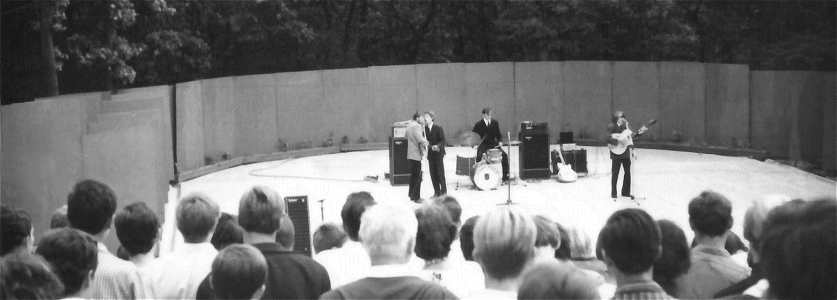 |
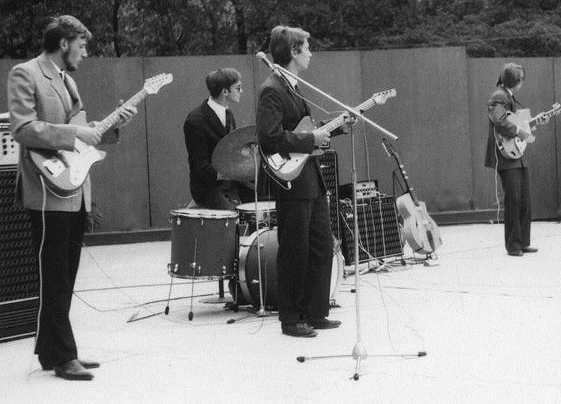 |
We had our
well-rehearsed strategy cut and dried. We set up the equipment and, like
for warming up, played half a song - "My Generation", needless to say.
I knew that the manager would come running and he did. He begged us to
lower the volume so I showed him the setting. We were playing at 1.5.
At 1.0 the sound went out. And, so did we…good riddance. Both sides were
relieved. As we were wrapping up an elderly gentleman (yes, gentleman)
came and started blabbering. He spoke continuously, like a drunk, and
after a while his blabbering was beginning to make sense. It was something
about his youth (back in the 'Old Days'), about him playing music and
associating with the right people, with the upward classes (the aristocracy?),
just knowing right from wrong and being at the right place at the right
time. I took him to be a kindred soul, somehow understanding the essence
of Merseybeat here in Outer Mongolia and expressing his loyalty. A loony,
yes, but a kindred loony. A funny fool.
"So, my dear sons" concluded the gentleman, "I know what you're about. Just because I look like a miner doesn't mean I don't have class, because a miner I used to be and I'm proud of it". He introduced himself: "Chief mining engineer so and so at your service". His eyes cleared up and he wasn't drunk. "My sons, if you come around here next time, please notify me in advance. I will cut sixty-six chickens to your honour and we will dine and drink and celebrate". We shook hands for a long while before he slowly walked off into the night. His hands were like bricks.… "You are not presentable." We had just finished loading gear back into the Ford and Gruenwald had a speech to make. "You are not saloon-fit and, if you're not saloon-fit, the establishment won't let you go onstage". He was blaming my hair for the situation. "Like this hair, Gaby. You don't need this hair. You are growing up, you're not that young any more. You can't count on the teenagers. Alright, you came this far because the teenagers like you, but don't aim to keep them. You can't keep them. How old are you, Gaby? Nineteen? You're not that young any more. Now you have to start looking out for the older crowds" (did I mention, that he was a Sinatra fan?) "and this is where it all begins. With the upward classes". Who was he referring to? The upper crust of the cadres? The Party? He was no Party-sympathiser. He was referring to obscure classes left over from the 'Old Days' - obscure but existing, mixed in with the Party elite, somehow. Budapest only. The eternal metropolis. "You're not making yourself saloon-fit - they will put you out here, Buffaloshitville, in the middle of nowhere". He was beginning to get homesick for Pecs, our nice and civilized and snobbish city, our private little Liverpool, and so was everyone but we would stay, just to hear the Words of Truth from his Excellency, Comrade Komjathy. We were not scheduled to play at the gala but we wanted to. The sun was setting and it was getting chilly in the mountains. Gruenwald warmed up the car and we climbed in (this time we took Peter, too) and left for Tarjan, only to stop the car immediately. The little open-reel tape deck that recorded most everything was left on the hood. In the car Gruenwald kept berating me and that helped me work up a genuine anger. When we got back to Tarjan I went storming off to find some head honcho and I found the secretary of the chief organiser. I talked to her so convincingly that she produced the head-guy. To him I expressed my inner turmoil, shock and disbelief. I demanded to be included in tomorrow's gala. He apologised, went back to his office, returned with sheets of paper and placed the FF in the first part, beginning at 2p.m. Our spot was to be at around three-thirty! That concluded my rampage and finally, back in the hotel, I quietened down. The official announcement took place next morning in the great theatre hall. The Jury seated itself on the stage with the bands and musicians scattered around the spectator seats. We found for ourselves a deserted corner. It wasn't difficult - we were pariahs. On the other hand, we didn't want any association with the Commie bands either. Let me be a little more objective here. Not all the other bands were opportunistic, Commie epigones; there were some decent ones among them, also discriminated against, but they were too shy to associate with us and, so far, nobody had heard us playing but the jury. If you call that hearing… If you call that playing… |
| The
food was good. That was the best thing at the Festival. It was all paid
for and we ate at the best hotel. (The Hotel.) We had fried mushroom
caps with tartare sauce and other such delicacies and even some beer, which
we had to buy ourselves. We had been chilling - relaxed - in a good mood,
like if we had won. Joking around, feeling fine, enjoying our renegade status.
The crunch was gone and there were some of our hardest-core fans on the
next tables. It was a decent-sized theatre that held about six hundred.
The stage was huge, split into three sections. One band played at the centre,
one was breaking down at the right corner and the next one was setting up
in the left. Rotation. Each band was allotted three numbers, no encore. We got there early and listened to the bands before us from backstage. (Recorded it too, on that little open-reel!) The standard material was Shadows and Del Shannon. In 1967… and yes, one band played a Beatles song: "For No One". Neatly. The audience's response was also neat and well-behaved - civilised clapping. And so our turn came. As we were setting up behind the curtain Esther Tamasi, the pretty young Commie announcer of the Hungarian Television, was doing her intro on us up front (she had picked up the material just a few minutes ago and had sensed something. So did the other media-people. Some word must have gotten around and there was something in the air). "And now I'd like to introduce to you the Funny Fools band". (Screaming. (Something's wrong? This was not customary around here.) Enter the hair-fixation.... "Three long-haired young men from the city of Pecs." Screaming. "I've asked the band's leader that, in Pecs, isn't he causing scandals with his long hair, or how is it? He said 'no, they've gotten used to it. It's mentioned along with the Cathedral as one of the city's famous sights'". (Laughter, screaming.) "And, as he remembers, since early childhood it's been kicking and howling whenever his hair got cut. So, this new fad benefits him to no end". (Laughter, screaming, louder.) Esther was in her element. She was totally enjoying it. Our disqualified status just added to her poignancy.She continued: "Please allow me to tell you a story. The band was playing at Pasto last night. Poor boys, their head, their hair was sweating: the place was packed with forty, fifty…sixty year olds… (laughter), and well, their music is for the young generation, what will happen here? To their surprise the audience clapped! So much so, that when the performance ended, up came a sixty-year old poppa with a mustache and told the boys: 'My sons, if next time you come around here, notify me in advance, and it will be sixty-six chickens that I will cut for your honor!'" ( Loud screaming, laughter, catcalls.) Esther really fired them up..... "Let me introduce the band: "Drums - Kelemen" (Screaming.) "Bass guitar - George" (More screaming.) "Twelve-string guitar - the band's leader, Kaponya" Loud screaming. (Goes on for a while.) Now she did the obligatory political jab, to show who really was the boss. She did it cutely. |
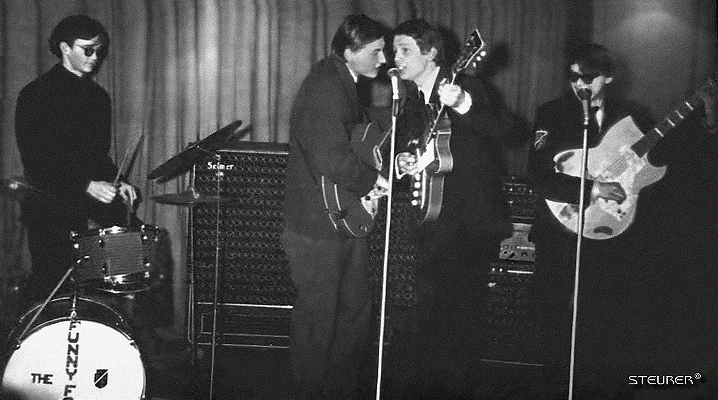 |
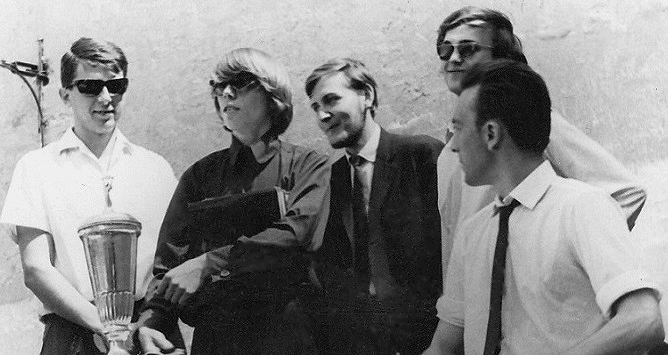 |
The curtains went up - and
all hell broke loose. We hadn't even started playing and the screaming
was overwhelming. It was the exact same scenario we'd all seen in the
Beatles' movies - even the kids looked the same. (Everybody knows the
famous shot with the four girls with Beatles pins on their clothing, sitting
up front, crying and screaming). It was a transporting, fantastic experience.
These kids were starved for letting it all out, letting their bottled-up
feelings, their happiness, come free and letting it be known whose side
they were on. We'd hit "Wait A Minute", a fast, downbeat rhythm, very
primitive and punctuated - but tricky. Big vocals - and we blasted!
The Selmers were turned up
to the hilt and it was heaven. The kids hadn't stopped screaming but we
managed to stay on top. Then, somebody turned on the auditorium lights
and the screaming died down. You could see the cops lined up on both sides
of the auditorium. They were inconspicuous, just standing by the walls
and watching. They didn't bother anybody but their presence was felt.
Then the lights went out again and the screaming resumed with a vengeance.
Not an official summons form though…The heading said: "Police Division for the Protection of Youth and Morals". This was somewhat intimidating but also perplexing. So far I've never heard of such entity. They haven't revealed themselves. And the implications I've never quite figured out: were they trying to protect me - as youth - from something or were they trying to protect the youth from me? The "moral" part I figured out: it was about …prostitution? But we had no prostitutes… The handwritten notice was brief and to the point. "You are summoned to appear at this office". Date, place, location. Signed: "Police Lieutenant S. Dani" I looked at mom with puzzled innocence. "I have no idea what this could be. Believe me, mom. I didn't do anything wrong that I know about". |
| What could
I possibly do? And, as I figured out that there was nothing I could do,
I've calmed down. I found Cseke (easily, at the Café Nador) and told him
about it. He was not very shocked. We just cursed and swore for some time
then we left it with the conclusion that there was nothing we could do but
pray. Of course I couldn't resist going to see The Nashville Teens. The
concert was held at the summer amphitheatre, the best concert venue in town.
It's nested in the gardens adjacent to the Cathedral which, with its impressive
four steeples, towers over the scenery. All the bigger concerts were held
there and many indeed ended in semi-rioting which was disturbing not only
for the police but for me. The stage was huge, big enough to hold regular
summer performances of the local branch of the National Theatre, including
grand operas. The acoustics were excellent. And the place charming, with
the wooden benches arranged in a widening semi-circle, surrounded by bushes
and tall shrubbery. It held about two thousand people. Some miracle must've
happened. As I got in line for the entrance, instead of the usual charge
towards the gate (the only one), the crowd proceeded in an orderly fashion.
True, there were cops all over, looking menacing, stick in hand. The progression was peaceful but they pulled out a guy here and there and beat him. Just for good measure… The concert went down superbly. Not only was the band fantastic - our first real British rock band - but, remarkably, there was no transgression from the audience (like throwing pillows towards the stage) which usually triggered brutal police actions which would've put me, and possibly Cseke, in jeopardy.) The kids must've been so spellbound that they forgot their strong urge to "participate". So, nothing happened that could entertain the Division for the Protection of Youth and Morals. (The only remarkable thing - besides the concert itself - was that my first love-to-be, Kinga, with whom I was loosely hanging out at the time, made friends with Ray Phillips. Just friends - and that, only one sided. And the side wasn't hers... Actually it came as part of Ray's antics of picking a pretty girl seated close to the stage and singing "Little Bird" to her. It worked miracles. With all the girls, but Kinga. She did register, though, but you couldn't just pick her like a cherry. So, Ray followed up with sending a big bouget of red roses to her home. (As far as I remember that's how it ended. But Kinga remembers…) You've got to be at the crest of your career to own a 1958 Studebaker… Even in the West. By the end of May 1967 The Funny Fools owned the biggest gear East Europe. The only complete, original Selmer set, mighty and beautiful. And expensive; all our families (and our friends' families) were left starving. Consequently, our sound was peerless - and loud. We needed a full time technician to maintain it. And Gabor found one in Budapest - the only place where such existed. His name was Lamby. At Gabor's home there was an extra room. He moved into that, received a steady wage that we somehow scraped up, and his share of the ever-growing supply of groupies (which was the main reason he joined us in "down village"). He also added to the equipment: a baby Hammond and the barely drivable Studebaker. The car must've belonged to some music-maffioso in Budapest, then it passed through Lamby in some shadowy dealing and he talked us into buying it. Like he had to exert himself… It cost us a fortune even in its rundown state; the transmission has been replaced by a Russian Volga Sedan's, the steering wheel had a 60% idling and it gobbled oil in a guzzling frenzy: a quart for fifty miles. But it looked marvelous with shiny white paint, a lots of chrome and a cherry red leather interior. Like in the books. And it was American, and it was a Studebaker, and no band in the country owned a real American car let alone a Csudavekker. |
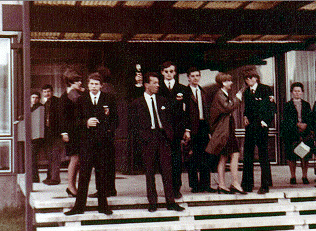 At the Entrance of the Hotel Tarjan May,1967 From left: A proper Hungarian "sixties-girl", Georgie, Gruenwald, Kelemen, Peter Buchberger, Mariann, Moi |
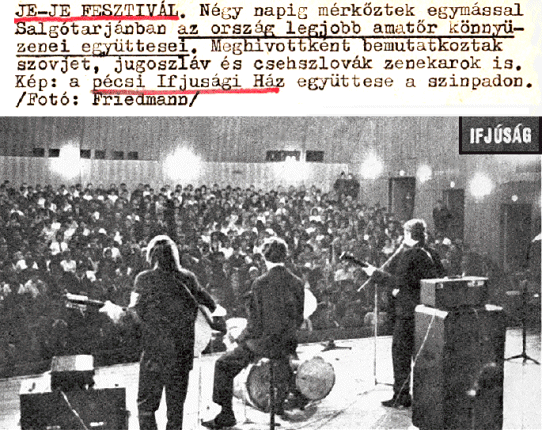 The state of Hungarian photojournalism in 1967 |
The Magyar
language can't cope with pronouncing "Studebaker", so it was promptly re-christened
to the phonetic equivalent "Csudavekker" which translates back to English
as "Amazing Alarm Clock". Soon, of course, the whole city gossiped about
the FF's humongous and beautiful American car and this again just added
to the allure. Allure galore… If nothing else, just this was worth the money.
Talk about being image-conscious, 1967. (The Police has stopped harassing
us by now). But buying Csudavekker also made good economics, strange as
it may sound at first. We were constantly touring, gigging every weekend
in a 100-mile radius, sometimes three, four gigs on a weekend. There were
Saturdays that we had a concert at 4 in town "A", a gig at 6 at town "B"
and we were back in the Olympia for the standard buli at 8. The fans followed us wherever we went. Transportation used to be a major headache. We've come a long way from the three taxis in the whole town just a few years ago, but automobiles were still scarce and the ones that could do the job even more so; and those who would take the band - and whatever came in the package - yet even fewer. These guys were expensive, the reliable ones even more so, and most were unreliable. Not to mention that the cars were either miserable, small and slow or all of the above. Pitiful East European puffing wrecks. Sometimes, having paid for the transportation left us with no money from the gig. These guys were making out better than the band. Enter the Amazing Alarm Clock. Six of us could comfortably fit in it plus the chauffeur - plus the whole equipment (most of it on the top rack). And the feeling! Lamby took the job of the chauffeur - nobody else would, or could. He also fixed it up, as much as he could, but that wasn't much; the oil guzzling and especially the steering couldn't be fixed. You should've seen him steering! To dodge something he'd had to rotate the steering wheel three times. So, he kept it slow - to avoid swerving. Every fifty miles we stopped and poured another quart of oil inside. We were doing a whopping 30 mph. It was fantastic. It cruised. Whoa! - how it cruised. And for all this, for the time we had the Studebaker we still made out a hundred percent better; we arrived on time, safe and sound - and feeling smug. And had money left over after everything was paid for. This was in October of 1967 and the band was riding high. Too high… Gigs left and right, money coming in - and out… The first gig we did with the Alarm Clock was in a village about thirty miles away; a wedding gig which we rarely accepted these days but this one paid so well that we had to take it. A battalion of fans were also coming, in Soviet Ladas, cars, trucks, bus, train, and by hitchhiking. I wasn't happy - lately the hardcore fans created some tight situations. They appeared to be enjoying them… The stage of the village's Kultur Center was best accessed through its back window. We could unload from Csudavekker straight onto the stage, and at the end, load straight back onto its roof rack. (This will be important.) The night grew older, then younger, we grew tired but played well. We played well on every gig, regardless what gig, or at least we tried. However, the disturbances started. They usually begin when some rowdy fan (and fans are rowdy, that's what makes them fans) picks up a local girl - often using the pick up line that he is with the band; manager, roadie, singer-but-having-bronchitis or something equally smart - the girl falls for it but her boyfriend doesn't. Nor do his friends… And the numbers are not on the visitors' side. This usually leads to inconvenience. It did. By the last hour the tension was so tangible that an organizer came to us and suggested that we start moving because they couldn't guarantee our safety. At least they were fair… They handed me the money and left us to our devices. Didn't expect us to be ready in ten minutes. The hall was empty by now. We unplugged the amps and loaded everything directly onto the roof rack, climbed through the window and were in the car. Lamby stepped on the gas - and we were out of harm's way. From the safety of our vehicle we could observe the skirmish unraveling. On the village's main street, leading out of town, first we passed a group of young men, running. Not too fast, like wild dogs in the beginning of a chase. They were about two dozen. We took these to be the chasers, backup. A little further out there was another group of young men, running. Aha, this is the vanguard! They were running faster. And a good mile ahead of them a pack of prey (the defenders, that is, our hardcore fans). There seemed to be a comfortable distance between chasers and chased. But where to run to? They will be caught in the end. They ran past a house surrounded by a fence. As they entered the fenced stretch the fence was there. After that, the fence was not there. It was in their hands. Armed forces running in the night, in the middle of nowhere! |
|
When they noticed us they cheered - and resumed running. They didn't seem
too worried. They were about a dozen. Not enough. We thought of helping
them somehow, calling the police or something, but there was no way. (No
cell phones…) We headed home. The story of The Battle of Bátaszék I heard
next day, when I ran into our top fan, Attila Cross. He was a casualty,
his head was bandaged. The run was much longer then they expected. They
burned up all that blood alcohol… The chasers started throwing stones. He
got one in the head. Like two more of our guys. Then, in just a nick of
time they reached a small train station which was closed. (It was not yet
four am). As they tried to rouse the station attendant the first group caught up with them and they fought. Thanks to the fence they de-fenced, their defense held until the station attendant opened the door - "hey, what's going on?" The next second the FF contingent invaded the station despite the attendant's protests. The second group of attackers got there, too, but couldn't get inside. They surrounded the station. A standoff issued. An exchange of pleasantries transpired. (No need for quotes, here…). Then, a dialog. Attackers: "Come out!" Defenders: "No!" This went on for a while and the situation was hopeless. For even if they could hold out until the next train at five, how would they get aboard? The attendant turned out to be a clandestine FF fan too, so he offered help. (Of course the guys lied something about the cause of the clash; they were the altar boys…). The shouting match kept on going when the station manager got on his USW service telephone. He started calling the police. The FF guys weren't very happy about this but they realized that the police was the lesser evil... "Cziko station calling, Cziko station calling! Come in police! We are in trouble!" After a while the police woke up. "This is the Police. What's happening Cziko station?" "We are surrounded and under attack! We need rescue!" "Who the hell got you surrounded at this ungodly hour? The Yugoslavs?" "Well, no…but I have a bunch of guys inside, seeking refuge from another bunch of guys on the outside". The Police was beginning to grasp the situation. "Who's inside and who's outside?" "Um…inside are the guys who came with the band from the city, you know…what's the name … some Funi Flux…Outside is an army of local youngsters. They are angry…I don't know why…" "Oké, Roger… We will be there soon. Hang in there. And keep us informed, we'll leave the channel open". The supply of information sounded like this: "Outside the attackers. Trying to come in! Inside the defenders. Holding the fort! Repeat… Roger??" Then the Police got there. The cause of the skirmish they couldn't determine. The fact they could establish was that the FF boys were being chased and attacked and have suffered injuries while the attackers, miraculously now only a dozen local boys, couldn't coherently explain their reason for violence. (They were drunk...) So the cops sent them home and took a fact-report from the defending altar boys, then stayed until everybody was safely on the morning train. Then commended the station attendant for his good handling of the emergency. The next day whole city was talking about the Battle Of Cziko. (And so did the local papers). The guys with the bashed-in heads walked around like heroes. The Amazing Alarmclock had served us well for the next three months. Then it had to be retired for repairs which never came. It graced the backyard of our condo building until I've left to where it came from… (It was still grounded in our courtyard back in Hungary when I first set foot in the USA). Somebody tell me why is it that only an American car is conducive to making out on its back seat? Because only an American car, a Chevy, a Cadillac or a Studebaker has soul. (And a "battered heart" to paraphrase Leonard Cohen). Real soul which can comfortably accommodate two young bodies. In this aspect American cars stand alone. And Csudavekker stood alone - but not abandoned. It always had visitors, sneaking inside on moonless nights; and Studebaker felt like at home again, transported through time and space… |
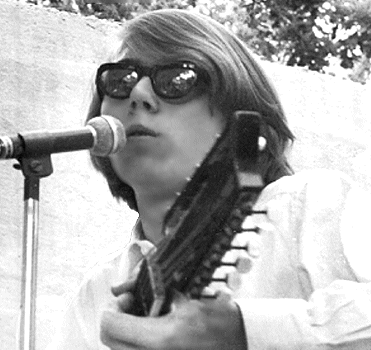 |
 Paul
Gabor Music
Paul
Gabor Music|
|
All
Original Material Copyright SixtiesCity
Other individual owner copyrights may apply to Photographic Images |